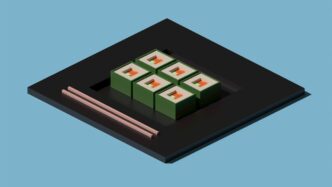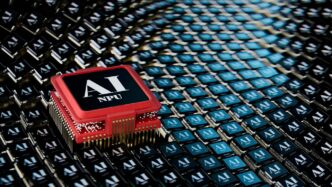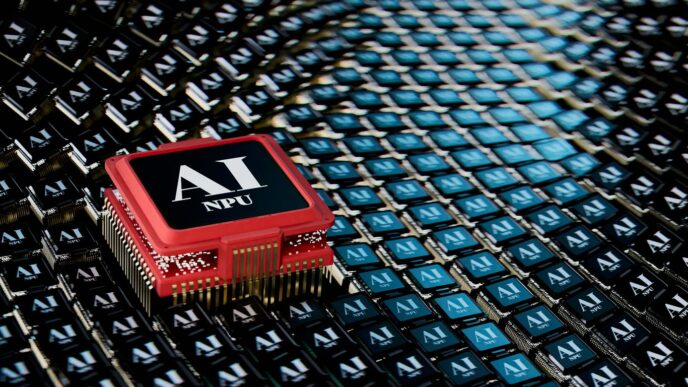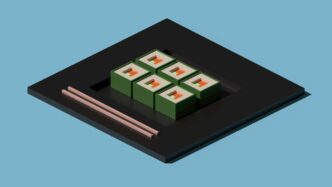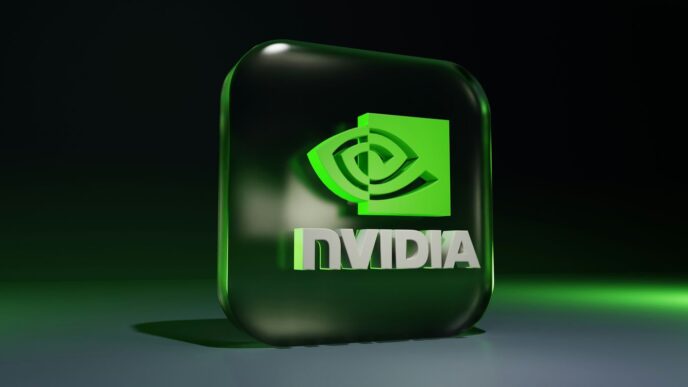Alright, let’s talk about quantum computer hardware companies. It feels like just yesterday we were hearing about these things in science fiction, but now? They’re actually starting to show up outside of labs. 2025 is shaping up to be a big year, where the rubber really meets the road for companies building this stuff. It’s one thing to have a fancy machine that works perfectly when everything’s just right, but it’s another to have one that can handle the real world. We’re going to look at how things are changing and who’s making waves in the quantum hardware scene.
Key Takeaways
- Quantum computer hardware companies are moving from research labs to real-world customer deployments in 2025, marking a critical test for practical application.
- Significant progress is being made in both logical and physical qubit development, with specialized quantum systems starting to emerge for specific tasks.
- Major players like Microsoft and Google are pushing forward with their hardware strategies, particularly in quantum error correction, while companies like Oxford Ionics are setting new performance records.
- New technologies like diamond-based systems are gaining traction, offering the potential for room-temperature quantum computing and more portable devices.
- Investment in quantum hardware is growing, with venture capital funding and corporate interest showing a clear upward trend, indicating a maturing market.
The Shifting Landscape of Quantum Computer Hardware Companies

From Labs to Real-World Deployment
For a long time, quantum computers felt like something out of science fiction, confined to university labs and specialized research centers. But things are changing, and fast. 2025 marks a significant turning point where these powerful machines are starting to move beyond theoretical discussions and into actual use cases. This year, we’ll see quantum computers deployed in customer networks and data centers, a real test for the companies building them. It’s one thing to have a quantum computer that works perfectly under ideal lab conditions with a team of experts running it. It’s another entirely to have it function reliably in the messy, unpredictable environment of a real business. The companies that truly succeed will be the ones who planned for this practical reality from the very beginning.
The Test of Practical Application
The hype around quantum computing has been building for years, but now the rubber meets the road. We’re moving past the ‘what if’ and into the ‘how do we use this?’ This shift means that the focus is no longer just on groundbreaking research, but on building hardware that is robust, accessible, and genuinely useful for solving real-world problems. Companies that have focused on building practical, deployable systems will likely pull ahead. It’s about demonstrating tangible results, not just theoretical possibilities. The ability to integrate these systems into existing workflows and provide clear benefits will be the key differentiator.
Beyond Theoretical Breakthroughs
While theoretical advancements are still important, the industry is increasingly focused on what can actually be built and used. This means a greater emphasis on:
- Logical Qubit Development: Making qubits more stable and less prone to errors is a huge hurdle. Progress here is vital for building fault-tolerant systems that can handle complex calculations.
- Physical Qubit Innovations: Researchers are constantly finding new ways to design and build qubits, aiming for better performance, longer coherence times, and easier scalability.
- Specialized Quantum Systems: Instead of trying to build one giant, do-everything quantum computer, companies are developing specialized systems designed for specific tasks, like optimization or material science. These purpose-built machines might offer practical advantages sooner.
- Hybrid Approaches: Combining quantum processors with classical computers is becoming the norm. This allows us to use quantum for what it’s good at and classical for everything else, creating more powerful combined systems.
Advancements in Quantum Hardware and Qubit Technologies
Progress in Logical Qubit Development
Things are really moving forward with logical qubits. For a while there, it felt like we were stuck with just physical qubits, which are super sensitive and prone to errors. You know, the ones that need to be kept colder than a polar bear’s picnic. But now, the focus is shifting. Companies and research places are pouring resources into making logical qubits a reality. These aren’t the actual hardware bits, but more like a smart way to represent quantum information that includes built-in fixes for mistakes. This is a big deal because it means we can actually start building quantum computers that are reliable enough for serious work. Think of it like upgrading from a shaky old bridge to a solid, modern highway.
Innovations in Physical Qubit Design
While the push for logical qubits is exciting, the underlying physical qubits are also getting better. Engineers are finding new ways to make these tiny quantum components more stable and less likely to mess up. This means fewer errors creep in from the start, which makes the whole process of error correction a bit easier. It’s like making the bricks for that highway stronger before you even start building.
Specialized Quantum Systems Emerge
It’s not all about building one giant, do-everything quantum computer anymore. We’re starting to see more specialized quantum systems being developed. These are like custom tools designed for a specific job, rather than a Swiss Army knife. The idea is that these purpose-built machines might be able to solve certain problems much faster than a general-purpose quantum computer. This could mean we see practical quantum advantages in areas like chemistry or materials science sooner rather than later.
Key Players and Their Hardware Approaches
Alright, so who’s actually building these quantum machines, and how are they going about it? It’s not just one big race with the same finish line for everyone. Different companies are really leaning into specific ways of making qubits and building their systems. It’s pretty interesting to see the different paths they’re taking.
Microsoft’s Hardware Strategy
Microsoft has been putting a lot of energy into a particular type of qubit called a topological qubit. The idea here is that these qubits are supposed to be way more stable and less prone to errors than other kinds. This focus on inherent stability is a big deal because it could mean less work down the line trying to fix mistakes. They’re not just talking about it either; they’ve been publishing research and showing progress, which is a good sign they’re serious about making it work.
Google’s Quantum Error Correction Achievements
Google, on the other hand, has been making some serious noise about quantum error correction. They’ve shown they can actually reduce errors in their quantum systems, which is a huge hurdle. Think of it like building a really complex structure – you need to make sure it doesn’t fall apart. Google’s work here is about building those safeguards right into the system. They’ve been able to demonstrate that their error correction methods are working, which is a big step towards building reliable, large-scale quantum computers that can actually do useful work.
Oxford Ionics’ Qubit Performance Records
Then you have companies like Oxford Ionics. They’ve been setting records for how well their qubits perform. We’re talking about things like qubit fidelity – basically, how accurate they are – and how long they can maintain their quantum state. They’ve achieved some really impressive numbers, showing that their approach, which often involves trapping ions, can lead to very high-quality qubits. This kind of performance is what you need if you want to run complex calculations without the whole thing falling apart due to noise or errors. It’s a different angle, focusing on making the individual building blocks as perfect as possible.
Emerging Quantum Hardware Technologies
Okay, so we’ve talked about the big players and their current tech. But what’s next? What’s bubbling up that could really change the game in the coming years? It’s not just about making more qubits; it’s about new ways of building and using them.
The Rise of Diamond-Based Quantum Systems
This is pretty neat. Instead of needing super-cold, massive setups, some companies are looking at diamond. Seriously, diamond. The cool thing here is that these diamond-based systems could work at room temperature. Imagine that – no more giant refrigerators for your quantum computer. This makes them way more practical for things like data centers or even smaller, edge applications. It’s a big step towards making quantum tech less of a lab experiment and more of a tool you can actually put places.
Room-Temperature Quantum Computing Potential
Following on from the diamond idea, the whole push for room-temperature quantum computing is a huge deal. Right now, a lot of quantum computers need to be kept incredibly cold, like near absolute zero. That’s expensive and complicated. If we can get reliable quantum computers that don’t need that kind of extreme cooling, it opens up so many more possibilities. It means smaller devices, less power consumption, and ultimately, wider adoption. This could be the key to moving quantum computing out of specialized labs and into everyday use.
Mobile and Portable Quantum Devices
This is where things get really interesting. Because of advancements like room-temperature operation and more compact designs, we’re starting to see plans for mobile quantum computers. Think about it: a quantum device you can actually move around. Germany’s Cyber Agency even awarded a contract to build the world’s first mobile quantum computer. This isn’t just a novelty; it could mean quantum capabilities for fieldwork, remote locations, or even defense applications where you can’t just haul a supercomputer around. It’s a shift from the idea of a fixed, massive quantum machine to something more adaptable and accessible.
The Integration of Quantum Hardware with Other Technologies
Okay, so quantum computers aren’t just going to sit in a lab forever. We’re starting to see them connect with the tech we already use, which is pretty wild. Think of it like giving your regular computer a super-powered brain for really tough jobs.
Hybrid Quantum-Classical Systems
This is a big one. Most of the problems we want quantum computers to solve are still way too complex for them to handle alone, at least right now. So, the smart move is to pair them up with classical computers. The quantum part tackles the really tricky bits, like simulating molecules for drug discovery or figuring out the best way to route a million delivery trucks. The classical computer handles everything else – the data input, the output, and the parts of the problem that don’t need quantum weirdness. It’s like having a specialist and a generalist working together.
- Quantum Processing Units (QPUs) working alongside CPUs and GPUs: This allows for specialized tasks to be offloaded to the QPU while the classical processors manage the bulk of the computation.
- New algorithms inspired by quantum mechanics: Even if a full quantum computer isn’t available, researchers are developing classical algorithms that mimic quantum principles to solve problems faster.
- Error mitigation techniques: Classical computers play a role in cleaning up the noisy results that current quantum computers often produce, making them more usable.
Quantum Processing Units in Data Centers
Imagine your local data center, the place that powers the internet and all your cloud services. Companies are starting to think about putting QPUs right in there. This isn’t about replacing the servers you know, but adding these specialized quantum chips to handle specific, high-value tasks. It means that complex calculations that used to take months or even years could potentially be done in hours or days. This integration is key to making quantum computing accessible beyond research labs. It’s a step towards quantum computing becoming a utility, like electricity, that you can tap into when you need it.
Networked Quantum Devices
Another cool development is linking multiple quantum computers together. Instead of having one giant, super-expensive quantum machine, we might have a network of smaller ones. This is similar to how the internet works – lots of computers talking to each other to create something bigger. This networking approach could make quantum resources more flexible and powerful. It also opens the door for things like distributed quantum computing, where different parts of a calculation happen on different machines, even if they’re miles apart. It’s a way to scale up quantum power without necessarily building bigger and bigger individual machines.
Investment and Market Momentum for Quantum Hardware
It feels like just yesterday quantum computing was something you only read about in sci-fi novels, but now, it’s really starting to get some serious attention. The buzz around quantum hardware companies is definitely picking up steam. We’re seeing a noticeable shift from purely theoretical discussions to actual, tangible progress that investors and businesses are paying attention to. This year, 2025, marks a significant point where quantum computers are expected to move out of research labs and into real-world customer networks and data centers. This transition is a big deal, and it’s putting the pressure on companies to show they can deliver, not just talk. It’s one thing to have a super-powerful quantum machine that works perfectly under ideal lab conditions, but it’s another entirely to have it function reliably in everyday business environments.
Venture Capital Funding Trends
Funding for quantum technology has been on an upward trajectory. While quantum computing firms are grabbing a good chunk of this investment, it’s important to remember that quantum tech as a whole still represents a small fraction of the total venture capital pie. Still, the numbers are climbing.
- 2024 saw a significant increase in venture capital flowing into quantum computing companies.
- Quantum software also attracted substantial investment, showing a broader interest in the ecosystem.
- Despite the growth, quantum technology’s share of overall VC funding remains relatively small, indicating room for further expansion.
Corporate Interest and Mentions
Businesses are increasingly talking about quantum. Mentions of quantum computing in corporate communications, like press releases and earnings calls, have jumped considerably. This uptick suggests that companies are starting to see quantum technology as something relevant to their future strategies, perhaps inspired by the rapid advancements in AI. They want to be prepared for the next big technological wave.
The Maturing Quantum Market
The market for quantum hardware is maturing. We’re seeing more companies commercially offering quantum processors, and the performance benchmarks are steadily improving. This growing maturity is reflected in the increased corporate interest and the steady flow of investment. It’s becoming clearer which companies are making real progress and which are still in the early stages. The development isn’t just about raw processing power; it’s also about making these systems more accessible and practical for a wider range of applications. This is why you’re seeing more specialized quantum systems emerge, designed for specific tasks rather than trying to be a jack-of-all-trades. Public markets are also starting to reflect this transition, with investors gaining exposure to this burgeoning field.
| Area of Focus | Investment Trend (2024) | Corporate Mention Trend (2024) | Market Maturity Indicator |
|---|---|---|---|
| Quantum Computing | High | Significant Increase | Growing |
| Quantum Software | Moderate | Increasing | Developing |
| Specialized Systems | Emerging | Nascent | Early |
Looking Ahead: The Quantum Road Continues
So, what’s the takeaway from all this? It’s clear that 2025 is shaping up to be a big year for quantum computers. We’re moving past just talking about what they could do and starting to see them actually show up in places where people work. Companies that have been building with real-world use in mind are the ones likely to do well. It’s not just about having a powerful machine in a perfect lab anymore; it’s about making them work when things aren’t so perfect. With advances in error correction and the way quantum and AI are starting to work together, we’re seeing new possibilities pop up in areas like finance, logistics, and even science. It feels like we’re on the edge of some pretty major changes, and keeping an eye on these hardware companies will be key to understanding where this whole field is headed next.
Frequently Asked Questions
What’s new with quantum computers in 2025?
In 2025, quantum computers are moving out of special labs and into real businesses and computer centers. This means they need to work reliably, not just under perfect conditions. Companies that built their machines to be tough and dependable will do the best.
Are quantum computers getting better at fixing their own mistakes?
Yes, a lot of work is being done to make quantum computers better at fixing errors. This is super important for making them more powerful and useful for tough problems. We’re seeing big steps in making ‘logical qubits,’ which are like more stable versions of the basic quantum bits.
Are there different kinds of quantum computers being made?
Instead of just one type of super-powerful quantum computer, companies are creating special ones for specific jobs. Think of it like having different tools for different tasks. Some might be great for figuring out tricky problems, while others are better for different kinds of calculations.
Can quantum computers work with regular computers?
Absolutely! Many new quantum systems will work together with the computers we use every day. This ‘hybrid’ approach lets the quantum part handle the really hard tasks, while regular computers help with other parts of the job. This makes them more useful for a wider range of problems.
Are companies investing more money in quantum computers?
Yes, there’s a lot more interest and money going into quantum computing. Businesses are starting to see how it could help them solve big problems and get ahead of competitors. This growing excitement means more companies are building and improving quantum technology.
Can quantum computers work without being super cold?
Some new types of quantum computers, like those using diamond technology, might work at normal temperatures. This is a big deal because it means they could be smaller, more portable, and easier to use in different places, without needing huge, expensive cooling systems.

